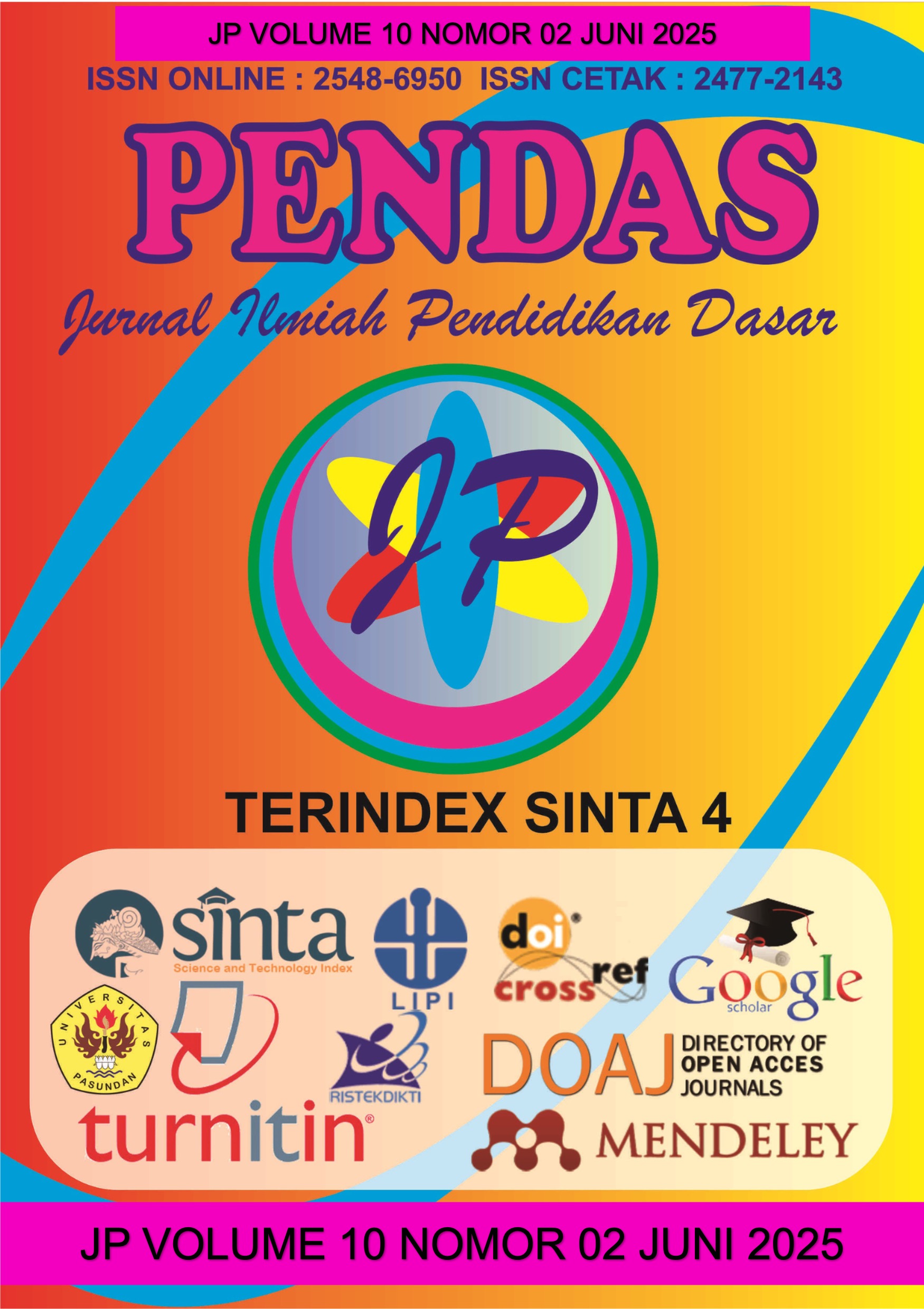PENGARUH MODEL DISCOVERY LEARNING TERHADAP HASIL BELAJAR IPAS MATERI BENCANA ALAM PADA PESERTA DIDIK KELAS V SDN TENGGILIS MEJOYO 1 SURABAYA
DOI:
https://doi.org/10.23969/jp.v10i02.23597Keywords:
discovery learning model, learning outcomes, IPASAbstract
This study aims to determine the influence of the Discovery Learning model on the learning outcomes of students in the IPAS subject at Year 5 of SDN Tenggilis Mejoyo 1, Surabaya. To this day, the learning activities remain predominantly teacher-centred and do not provide opportunities for students to develop independently through discovery and critical thinking activities. The research employs a qualitative approach. The population consists of classes V-A and V-B, each comprising 29 students, which serve as the sample for this study. The data collection technique used is a learning outcome test. Data analysis methods include prerequisite tests, namely normality and homogeneity tests. Subsequently, hypothesis testing is carried out using the t-test. The research instrument utilised comprises pre-test and post-test assessments. The findings indicate a significant difference between the average scores of the experimental and control classes. Data analysis shows that students’ learning outcomes in IPAS, using the Discovery Learning model, achieve an average score of 73.38 in the experimental class, while the control class obtains an average score of 64.59. Therefore, it can be concluded that the Discovery Learning model positively influences IPAS learning outcomes, and students taught through this model are more active and demonstrate better understanding compared to those taught using conventional methods.
Downloads
References
Aspi, M., & Syahrani. (2022).
Profesional Guru dalam Menghadapi Tantangan
Perkembangan Teknologi Pendidikan. Indonesian Journal of Education (INJOE), 3(2), 291–300. https://doi.org/10.54443/injoe.v3i2.35
Kurniawan, A., Mahmud, R.,
Rahmatika, Z., & Mustofa, M.
(2022). Dasar-Dasar Ilmu
Pendidikan
MAGFIRAH, Magfirah, et al (2020).
Peningkatan Kemampuan
Penalaran Adaptif Siswa Melalui Penerapan Model Pembelajaran PGSD. In: Prosiding Seminar Nasional Matematika dan Sains. 2020. p. 31-37.
Marisya, A., & Sukma, E. 2020.
Konsep Model Discovery Learning pada PembelajaranTematik Terpadu di Sekolah Dasar Menurut Pandangan Para Ahli. Jurnal Pendidikan Tambusa, 4(3), 2189-2198.
MUHAMMAD ZAKIY, S. E. I. SPSS
Penelitian Keperilakuan: Teori dan Praktik. Prenada Media, 2021.
Norfai, S. K. M. (2022). Analisis data
penelitian (Analisis Univariat, Bivariat dan Multivariat). Penerbit Qiara Media.
Pristiwanti, D., Badariah, B.,Hidayat,
S., & Dewi, R. S. (2022). Pengertian Pendidikan. Jurnal Pendidikan Dan Konseling (JPDK), 4(6), 1707–1715.
Puspitasari, Yesi & Nurhayati, S.
(2019). Pengaruh Model Pembelajaran Discovery Learning Terhadap Hasil Belajar Siswa. Jurnal Pendidikan Dan
Kewirausahaan, 91–106.
Rosdiana. 2022. Penerapan Model Pembelajaran Discovery Learning untuk Meningkatkan Hasil Belajar Siswa Mata Pelajaran IPAS Terpadu di Kelas VII SMP Negeri 4 Bolo Kecamatan Bolo Kabupaten Bima Tahun Pelajaran, 2018/2019. Jurnal Pendidikan Sekolah Dasar, 3(2), 17–22.
Salsabila, A. K., & Susiloningsih, W. (2024). Model pembelajaran Discovery learning Material on the Human Circulatory System for Class IV lementary School.
Sugiyono. (2022). METODE PENELITIAN KUANTITATIF. ALVABETA,CV.
Susiloningsih, W. (2021). Kemampuan Analisis Materi Mahasiswa Melalui Model Pembelajaran Kontekstual Berorientasi High Order Thingking Skill. Malih Peddas (Majalah Ilmiah Pendidikan Dasar), 11 (1)(1), 25– 31.
WULANDARI, Ana Yuniasti Retno; QOMARIA, Nur. Analisis Statistik Deskriptif dan Uji Hipotesis Dengan SPSS. Bayfa Cendekia Indonesia, 2024.
Undanng-Undang. RI. NOMOR 20 TAHUN 2003. Tentang Tujuan Pendidikan Nasional
Lyznicki, J. M., Young, D. C., Riggs, J. A., Davis, R. M., & Dickinson, B. D. (2001). Obesity: Assessment and management in primary care. American Family Physician, 63(11), 2185-2196.
Hodgson, J., & Weil, J. (2011). Commentary: how individual and profession-level factors influence discussion of disability in prenatal genetic counseling. Journal of Genetic Counseling, 1-3.
Fariq, A. (2011). Perkembangan dunia konseling memasuki era grobalisasi. Pedagogi, II Nov 2011(Universitas Negeri Padang), 255-262.”
Downloads
Published
Issue
Section
License
Copyright (c) 2025 Pendas : Jurnal Ilmiah Pendidikan Dasar

This work is licensed under a Creative Commons Attribution 4.0 International License.














































